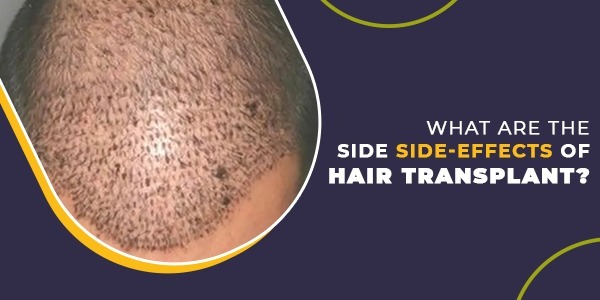Hair restoration is a revolutionary medical treatment developed to combat baldness and hair loss. Individuals are getting more interested in hair transplant surgery as a result of an increase in male and female pattern baldness, as well as technical improvements.
Hair Transplant surgery, be it FUT or FUE hair transplant in Raipur, both are considered safe. As a patient, you should know about the underlying side effects involved in hair transplant Surgery. It is usually a good idea to seek the opinion of recognized medical professionals who are experienced in hair transplant treatments. This blog will help you to understand some of the most common side effects of hair transplant procedures.
-
Bleeding:
Although bleeding during a hair transplant is rare, it should not be overlooked. As a result of scalp pressure, some persons may develop bleeding. Bleeding may occur during the treatment, which can be stopped by applying tumescent fluid (an anesthetic technique used in cosmetic surgeries) with mild pressure.
-
Pain:
Although FUE is less painful, some people may feel slight discomfort. Mild pain medicines will suffice for the next few days. Pain is a temporary side effect that disappears with time.
-
Swelling:
People who have had hair transplants on the front side of the scalp can expect to have a slight swelling on the forehead and around the eyes for a few days after the procedure. Anti-edema medication and forehead tight band taping can help prevent swelling around the eyes.
-
Hair thinning:
The transplanted hair sheds after 2 weeks due to the stress on the hair follicles. Hair usually regrows within 2-3 months. Thinner developing grafts will be replaced by thicker hair within a few months.
-
Shock loss:
As a result of the operation, existing hair in the donor or recipient region may get stressed and fall out. This happens because the hair follicles lose blood supply while being relocated from one spot to another. It will recover its growth over time. Female hair transplant recipients are more likely to experience shock loss.
-
Itching:
Post-surgery, the patient may experience mild itching on the recipient and donor sites during the healing process. Washing with mild shampoo on a daily basis can help to alleviate this problem.
-
Cysts:
Grafts that are grafted during the extraction or implantation process can eventually grow out, resulting in small acne-like lesions. Antibiotic creams applied locally can help control them.
-
Infections:
Infections may occur in unusual circumstances if proper sterile techniques are not used during the procedure.
-
Hiccups:
Hiccups are an unexpected consequence of hair transplant surgery. It is rare, with just 5% of patients experiencing this problem. If it lasts longer than a week, you may have difficulty eating or sleeping. Those who develop hiccups after hair transplant surgery are given medicines by doctors.
-
Numbness:
Numbness is a common side effect of surgery that occurs at the recipient site. This numbness lasts for a few weeks and is only temporary. It gets to normal after a few months.
Conclusion
We wish you the best of luck with your hair transplant and wish you a safe and successful procedure! If you’re looking for a good hair transplant clinic in Raipur with the most experienced hair transplant doctors, Auqual is the place to go. They employ some of the city’s best hair transplant specialists so that you can get the best Hair Transplant in Raipur.

